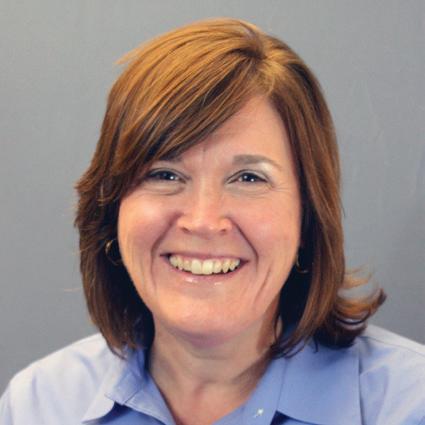Illinois Baptist
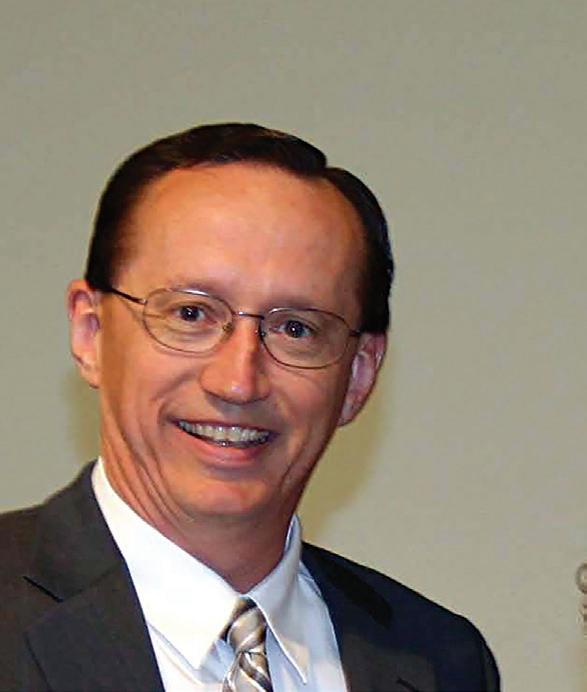



Broadview | “If we’re going to be gospel people, we’re going to be about the glory of Christ. And if we’re going to be about the glory of Christ, then we are going to be people that pray,” said David Choi, pastor of Church of the Beloved in Chicago.
“When man works, man works. But when man prays, God works.”






Choi was one of several Illinois prayer leaders who helped facilitate the “Prayer Link” gathering October 7 at Broadview Missionary Baptist Church in the Chicago suburbs. The meeting, which also included prayer leaders from across the Southern Baptist Convention, was designed as a “Great Commission Prayer Experience” aimed at encouraging people to pray for the mission fields around them.
The timing of the meeting, amid political turmoil and recent unrest in several U.S. cities, drove home the urgency of each 60-minute prayer session.
Each hour consisted of a 10-minute presentation of biblical, bold, and challenging material related to prayer, 20 minutes of facilitated
They’re engaged but distracted, open but cautious. How will we reach them?
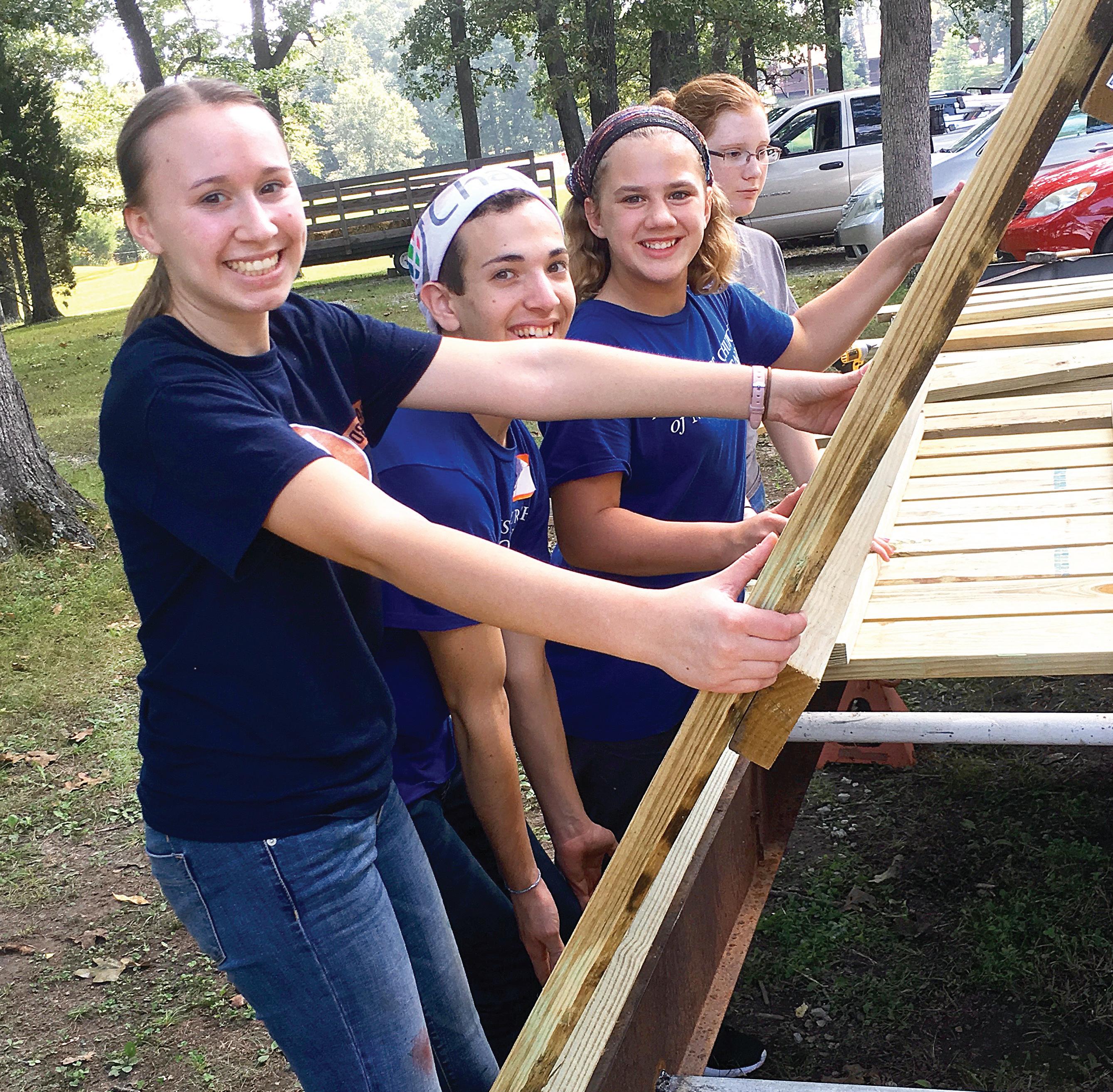


“In an increasingly secular culture, the Bible remains a highly regarded and well-read text among the vast majority of American teens—most of whom believe it to be sacred.”
– David Kinnaman, Barna Group“How often, if ever, do you actually read the Bible, not including times when you are at a church service or church event?”
Every day
NATE ADAMSRecently I was invited to western Kentucky to speak at the 204th anniversary celebration of the small, country church where my great-grandfather is buried, 12 miles from where I was born. When this church was established in 1812, James Madison was President, and George Washington had been dead less than 13 years.
There are not many churches in Illinois that old— three, by my count. A lot of people focus on what makes a church grow, but my experience at this country church made me think instead about what makes a church last. Here’s what I observed.
Several times/4+ times a week
Once a week
Once a month
Three or four times a year
Once or twice a year
Less than once a year
Never
Teens’ motivations for reading the Bible:
11%
11% 37%
3 11%
It brings me closer to God
I know I’m supposed to
It is part of my studies at school
I need comfort
3% 9% 10% 8% 54 54% 12% 10% 8% 6% 11%
I have a problem I need to solve or I need direction
Some other reason
– Barna.org, Sept. 2016

Giving by IBSA churches as of 10/14/16
$4,660,220
Budget Goal: $4,967,308
Received to date in 2015: $4,750,027
2016 Goal: $6.3 Million
Editor - Eric Reed
Graphic Designer - Kris Kell
Contributing Editor - Lisa Sergent
Editorial Contributors - Meredith Flynn Morgan Jackson
For questions about subscriptions, articles, or upcoming events, contact the Illinois Baptist at (217) 391-3119 or IllinoisBaptist@IBSA.org
The Illinois Baptist is seeking news from IBSA churches. E-mail us at IllinoisBaptist@IBSA.org to tell us about special events and new ministry staff.


POSTMASTER: The Illinois Baptist is owned and published every three weeks by the Illinois Baptist State Association, 3085 Stevenson Drive, Springfield, Illinois 62703-4440. Subscriptions are free to Illinois Baptists. Subscribe online at IBSA.org
First, a church lasts when it is solidly anchored in the Bible. Some churches today put a lot of energy into services or programs that attract people and meet needs. Those can be good things, of course, unless they degenerate into mere social services that don’t deliver the lifechanging gospel and truth of God’s word. I had the privilege of reading my sermon text that morning from my greatgrandfather’s KJV Bible that I inherited from my grandparents. Together, this enduring congregation and I looked into God’s enduring Word for guidance.
Second, a church lasts when it is connected by family. I want to be careful with my compliment here, because there can be perils in a church connected by family as well as strengths. Some churches allow their family ties and motivations to trump what’s best for the church and its mission to the world. But when multiple generations and branches of a family or families stay devoted to the same church over time, they can bring that church a remarkable resilience along with deep connections and commitment. After all, I was there for the sake of my great-grandfather. And I met, for the first time that Sunday, my second cousin, who now farms the fields my great-grandfather farmed.
Third, a church lasts when it has faithful, optimistic leadership. This church’s current pastor is retired, and in fact invested several years in southern Illinois as a contemporary of my dad. Yet he was energetic, enthusiastic, and personable—and clearly loved and trusted. With a twinkle in his eye, he introduced me to lay leaders and to children and students who were participating in the service that morning. His own effective leadership is being skillfully discipled into the church’s future leaders. And finally, a church lasts when it doesn’t quit. I’m writing this the day after the Chicago Cubs won their division series over the San Francisco Giants, with a dramatic, 4-run comeback in the top of the ninth inning. It was the day after a 13-inning loss to those same opponents. After their emotional victory, the team spontaneously gathered on the pitcher’s mound and chanted, “We don’t quit. We don’t quit!”
At the risk of stating the obvious, a church that lasts simply refuses to quit. They may not be large, or wealthy, or exceptionally gifted, but they are steadfast. Year after year, decade after decade, generation after generation, and sometimes century after century, they simply stay at it.
I probably could have suggested a few growth principles to this church that might have helped them. But this wasn’t a day for me to teach them how to reach 200 in attendance. It was a day for them to teach me how to reach 200 in endurance.
Nate Adams is executive director of the Illinois Baptist State Association. Respond at IllinoisBaptist@IBSA.org.
What a visit to an old family church taught me about endurance.Nate Adams (left) with his mother, Romelia, and members of New Bethel Baptist Church near Eddyville, Kentucky. At the church’s 204th anniversary celebration, Mrs. Adams presented an old newspaper article about the church’s 1812 founding that she recently unearthed.
Missions opportunities to highlight gathering in Metro Chicago
Chicago | Final preparations are under way for the 110th IBSA Annual Meeting November 2-3. The event at Broadview Missionary Baptist Church in metro Chicago will focus on cross-culture ministry opportunities in Illinois. The keynote speaker will be Dr. Jeff Iorg, president of Gateway Seminary of the SBC, called Golden Gate Seminary prior to its relocation from the San Francisco Bay Area to metro Los Angeles this year.
“Dr. Iorg is among the most compelling, thoughtful, and missional voices in Southern Baptist life today, especially when it comes to understanding post-Christian culture in America,” said IBSA Executive Director Nate Adams. “I’m so grateful that he is leading our West Coast seminary into the future, where pastors and leaders will engage values and cultures that are already very different from those of the past century.”
Iorg is a former church planter and state convention executive director in the Pacific Northwest. As a leader of Southern Baptist work on the West Coast,
also meeting at broadview
Iorg has addressed many of the cultural challenges now facing evangelicals in the Midwest. He has written frequently on theological and biblical perspectives on marriage, sexuality, and gender. His book “Building Antioch” shows from the New Testament how an ordinary believing congregation can become a transformational community.

“Illinois Baptists will come away from Dr. Iorg’s messages challenged and transformed, I’m sure,” Adams said. The Wednesday evening session, including Iorg, will focus on a four-phase process for engaging ministry across cultural barriers. Adams will outline the plan and share testimonies and videos of Illinois churches carrying the gospel to people unlike themselves.
“My own recent trips to Chicago have reminded me again how diverse our churches are, and even more so how varied and challenging are the cultures that our churches need to reach,” Adams said. “I hope this year’s Annual Meeting will bring to all of us a new vision and higher level of commitment to ‘cross culture’ with the gospel.”
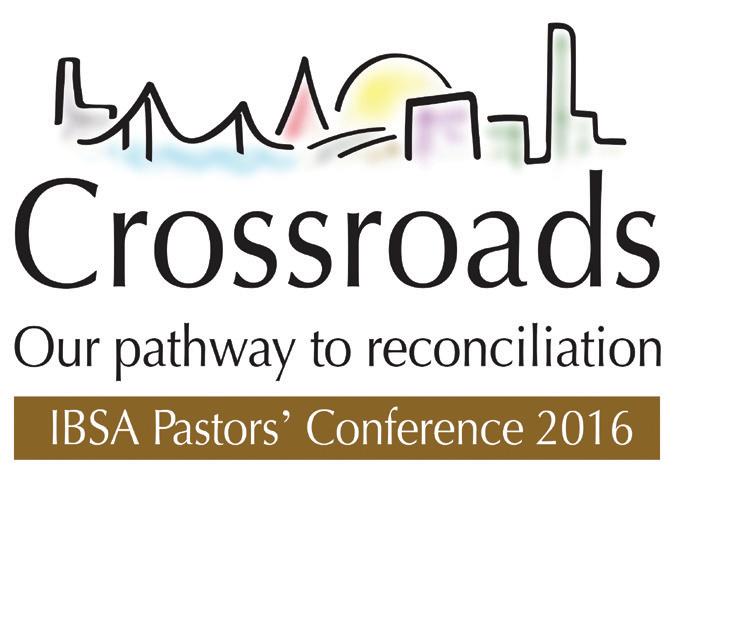
People who have nothing in common can find much in common in Jesus Christ. That’s the focus of the meeting that precedes the IBSA Annual Meeting.
“There is a great divide in our country especially in the areas of politics, race, and even in many of our churches,” said David Sutton, president and organizer of the IBSA Pastors’ Conference. “That is why I am very excited about this year’s Pastors’ Conference. I believe God has called us together for such a time as this. We have some great servants of God who will help us address today’s social issues from a biblical perspective.”
Featured speakers are Jacksonville, Florida pastor H.B. Charles, Jr., former SBC President Fred Luter of New Orleans, and two well-known Illinois pastors, Scott Nichols and Jonathan Peters.
November 1-2
The speakers will focus on reconciliation from 2 Corinthians 5:14-21. The pastors’ meeting will include breakout sessions on cross-cultural relationships, evangelism strategies, and more.
The conference opens on Tuesday, November 1 at 1:30 p.m. A full schedule is available at IBSAAnnualmeeting.org.
Follow the latest Illinois Baptist news





November 2-3
IBSA President Kevin Carrothers, pastor of Rochester First Baptist Church and Vice President Adron Robinson, pastor of Hillcrest Baptist Church in Country Club Hills, will also bring messages.

In addition to the session on the variety of ministry opportunities in Illinois, the meeting will include two business sessions on Wednesday afternoon and Thursday morning. Vision tours of Chicago-area ministry opportunities are available. Seating is limited, so online registration is encouraged.
www.IBSAAnnualMeeting.org
The speaker for the Pastors’ Wives Luncheon is Vicki Munton, wife of pastor Doug Munton of First Baptist Church of O’Fallon.
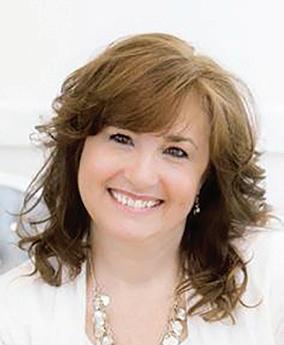
The all-morning event on Wednesday, Nov. 2, starts with a coffee fellowship at 8:30 a.m. The program begins at 9 a.m. and after a meal, concludes at noon. RSVP is requested right away to organizer Lindsay McDonald of FBC Casey (lmcdonald_31@ hotmail.com). Tickets are $15. Please make
a check payable to IBSA Pastors’ Wives and mail to Stevi Smith, 1302 W. Robinson St., Harrisburg, IL 62946.

Other groups meeting during the threeday gathering are the Young Leaders Network, Church Planters, and Associational Directors of Missions and Moderators. Information about those meetings is online at IBSAAnnual meeting.org.
The Young Leaders Network will meet Tuesday, Nov. 1 at 9 p.m., following the evening session of the Pastors’ Conference. Mark Mohler, pastor of Second Baptist Church of Marion, will lead a panel discussion and a late-night nosh of wings ‘n’ things.
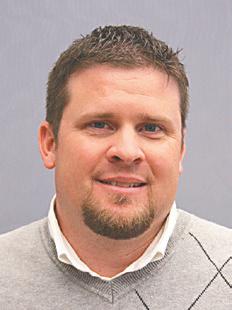
In response to the 100th anniversary of Planned Parenthood, a coalition of pro-life organizations has launched a campaign— #100YearsofAbuse—to counter the celebrations planned by the nation’s largeest abortion provider. The Planned Parenthood anniversary is “a tragic milestone for our nation and a reminder of the millions of unborn children who will never have a birthday,” the pro-life coalition said in a written statement.
The current UNITED Tour, sponsored by prolife outreach 40 Days for Life, includes prayer vigils outside abortion facilities like Planned Parenthood. The tour stopped in downtown Chicago Oct. 13, across from a Family Planning Associates abortion facility.
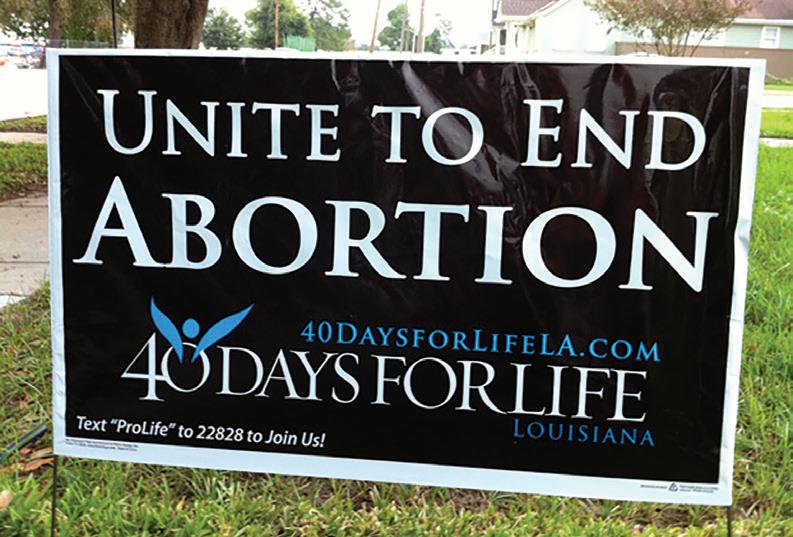
Four churches in Massachusetts are fighting a state law that would limit the free speech of pastors and require churches to allow transgender persons to use the restroom of their choice.
General Law 272, known as “Crimes against Chastity, Morality, Decency and Good Order,” was amended in Juy to add gender identity to a list of protected classes. The four congregations filed a pre-emptive lawsuit in October against the law, which churches would be subject to if they hold “secular events,” officials have said.
The law also prohibits discriminatory speech, or speech that “incites” discrimination, which could apply to biblical teaching about gender and sexuality.
Roy Moore, the Alabama Chief Justice who earlier this year instructed judges in his state not to issue marriage licenses to same-sex couples, has been suspended without pay for the rest of his term for “requiring defiance of the United States Supreme Court” and a district court that had required the judges to issue the licenses.
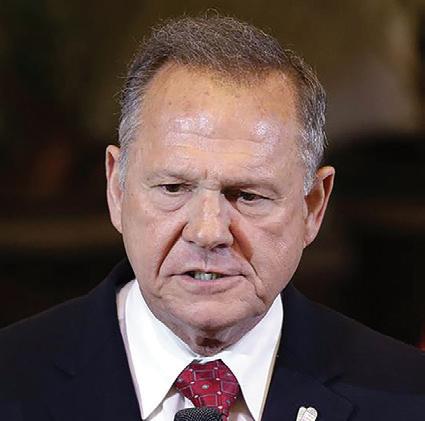
Moore previously lost his job in 2003, when he defied a court order to remove a Ten Commandments monument at a judicial building. He plans to appeal the latest ruling.
– Baptist Press, World Magazine
table discussion, and 30 minutes of prayer, praise, and petition focused on themes surfaced by the Holy Spirit.
Gary Frost, national facilitator of prayer and compassion initiatives for Mission America Coalition, led more than 70 attendees in interceding for their communities and neighborhoods, often interpreted as Jerusalem in the model outlined in Acts 1:8.
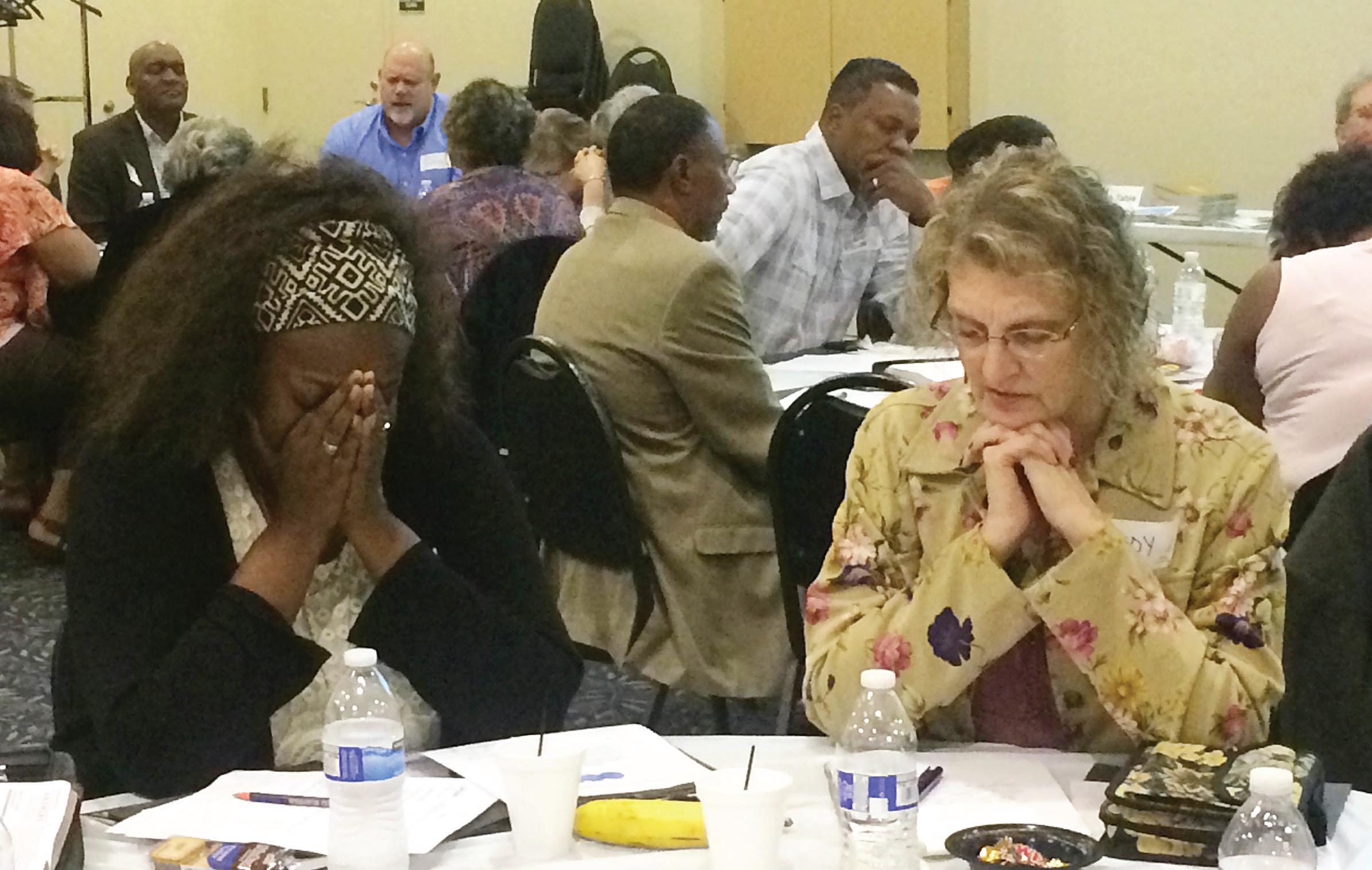
“Our Jerusalem is that area of ministry in our life with the people that we come in contact with every day, the people who live around us. The problem is, that just because people have proximity, does not mean they have affinity,” Frost said. Many individuals are near us geographically on a daily basis, he added, but we have no real concern for them, who they are, or the state of their soul.
Kevin Carrothers, president of IBSA, led the time of prayer that followed Frost’s message. With the idea of letting Christ’s compassion flow out of us to everyone we meet, Carrothers encouraged attenders to pray for their own homes and for the wellbeing of their communities, challenging people to ask
God how he wants them to make a difference where they live.
David Choi led a session on praying for church revitalization and church planting. In the U.S., we tend to be all about our individual accolades and strengths, he said. “But the gospel is about finding your weakness, finding your deficiency, finding what you’re not good at, and then crying out to the God who is able to do immeasurably more than all we can ask or imagine.”
As Cheryl Dorsey, prayer coordinator for the Chicago Metro Baptist Association, led the following time of prayer, the pray-ers found a spot along the perimeter of the room and called out to God, interceding for their churches, repenting of their prayerlessness, and praying for the salvation of those within their sphere of influence who don’t know Christ.
“We don’t need more strategies; we need prayer,” Choi said in his message. “Not just religious prayer, but gospel prayer. Where we recognize that we have nothing without him.”
Springfield | Ken Wilson is IBSA’s new church planting catalyst for middle and southern Illinois. Wilson has served in Makanda, Ill., since 2010 as a consultant, supply preacher, and church planter of Southern Illinois Country Church. Prior to that, he was a North American Mission Board church planter strategist and director of missions in northern Michigan.
Wilson’s earliest pastoral experience came in southern Illinois, where he led South Benton Missionary Baptist, Lake Milligan Missionary Baptist in Miller City, Samaria Baptist in Albion, and United Missionary Baptist in Buncombe. During his eight years as pastor in Buncombe, the church baptized more than 200 people and became an Acts 1:8 church, sending out mission teams lo-
cally and to central and northern Illinois, Missouri, South Dakota, and Romania.
“I am excited to have Ken join the Church Planting Team,” said IBSA’s Van Kicklighter, associate executive director for church planting. “His knowledge of the state and existing relationships with pastors and leaders gives him a real advantage in his new role.

“We have been praying about who would come and fill this vacancy on our team. I believe Ken is an answer to our prayer.”
Wilson earned bachelor’s, master’s, and doctoral degrees from Covington Theological Seminary. He has led more than 100 mission teams, helping plant churches in Michigan, South Dakota, and Romania, along with Illinois. He and his wife, Cindy, have four children and four grandchildren.
Turmoil over leaked audio tapes and e-mails has detracted from the usual issues in a presidential election, but the issues still matter. Here, in their own words, is how Hillary Clinton and Donald Trump frame their positions on some of the country’s most pressing matters.
Clinton: “Women’s personal health decisions should be made by a woman, her family, and her faith, with the counsel of her doctor. Hillary will fight back against Republican attempts to restrict access to quality, affordable reproductive health care.” (HillaryClinton.com)
Clinton: According to her campaign website, Clinton “will introduce comprehensive immigration reform with a pathway to full and equal citizenship within her first 100 days in office. It will treat every person with dignity, fix the family visa backlog, uphold the rule of law, protect our borders and national security, and bring millions of hardworking people into the formal economy.”
Clinton: “Regardless of who wins in the fall, the balance of the court hangs on this election. So, if you care about a woman’s right to safe and legal abortion; protecting voting rights; marriage equality; getting the outsized influence of money out of politics; giving more people access to health care; keeping families together; or preserving any other fundamental right, it’s time to register to vote.” (HillaryClinton.com)
Clinton: “Too many young African American and Latino men,” Clinton said in a Sept. 26, 2016, debate, have “ended up in jail for nonviolent offenses.” She advocated reducing mandatory minimum sentences, “which have put too many people away for too long for doing too little.”
Clinton: “As Americans, we hold fast to the belief that everyone has the right to worship however he or she sees fit,” Clinton wrote in a Deseret News op-ed in August. “I’ve been fighting to defend religious freedom for years.”
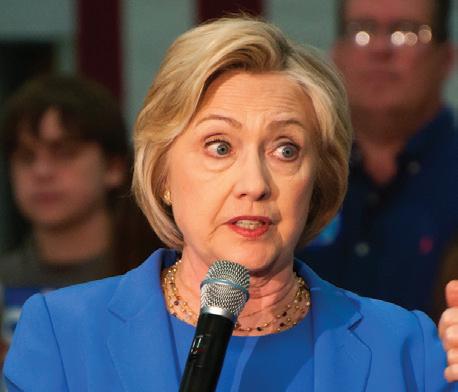
Trump: “Let me be clear—I am pro-life. I support that position with exceptions allowed for rape, incest, or the life of the mother being at risk. I did not always hold this position, but I had a significant personal experience that brought the precious gift of life into perspective for me.” (DonaldTrump.com)
Trump: On Dec. 7, 2015, Trump issued a press release “calling for a total and complete shutdown of Muslims entering the United States.” But he later said he would only ban immigration of Muslims from “terror states.” His website currently states his intention to “suspend the issuance of visas to any place where adequate screening cannot occur, until proven and effective vetting mechanisms can be put into place.”

American evangelicals are divided as they head to the polls, a new survey by LifeWay Research found. Fewer than half (45%) of those polled said they plan to vote for Donald Trump, while 31% said they plan to vote for Hillary Clinton. Libertarian Gary Johnson came in at 8%, but 15% of voters said they were undecided.

Evangelical voters also are divided along racial lines, the survey reported. While 65% of white Americans with evangelical beliefs favor Trump, Clinton was the candidate of choice for just 10%. But among AfricanAmericans, Hispanic Americans, and Asian-Americans with evangelical beliefs, 62% support Clinton, compared to 15% for Trump.
“This group of Christians share the same core beliefs—but they don’t vote the same way,” said Scott McConnell, executive director of LifeWay Research. “There are significant cultural and political divides among evangelicals that won’t easily go away.”
Republican lawmakers have introduced legislation that would make it easier for churches and non-profits to endorse political candidates. The Free Speech Fairness Act, introduced Sept. 28, would effectively repeal the Johnson Amendment, which limits political speech by organizations that receive tax-exempt status. House Majority Whip Steve Scalise, R-La., said the point of introducing the act now is to facilitate discussion about religious liberty prior to the presidential election.
Trump: “We have a very clear choice in this election,” Trump said in September. “The freedoms we cherish and the constitutional values and principles our country was founded on are in jeopardy. The responsibility is greater than ever to protect and uphold these freedoms and I will appoint justices, who like Justice Scalia, will protect our liberty with the highest regard for the Constitution.”
If elected, Donald Trump has promised to repeal the Johnson Amendment.
The leaked conversation between Republican presidential nominee Donald Trump and TV host Billy Bush could further splinter an evangelical voting bloc unsure of how to vote in November, some say.
Trump: An aspect of maintaining law and order should be the use of “stop-and-frisk” procedures, Trump said in the same debate. “We need law and order in the inner cities because the people that are most affected by [urban violence and unrest] are African American and Hispanic people.”
“Increasingly, moderate and conservative Christian women are speaking out about Trump’s brand of misogyny and divisiveness, and condemning support for the nominee or silence about him from male evangelicals,” former Barack Obama advisor Joshua Dubois wrote for The Daily Beast.
Trump: “The Little Sisters of the Poor, or any religious order for that matter, will always have their religious liberty protected on my watch and will not have to face bullying from the government because of their religious beliefs.”
(DonaldTrump.com)
– Read the full version of this list from Baptist Press at BPNews.net.
Dubois pointed to popular Bible teacher and author Beth Moore, who tweeted after Trump’s remarks were made public: “I’m one among many women sexually abused, misused, stared down, heckled, talked naughty to. Like we liked it. We didn’t. We’re tired of it.
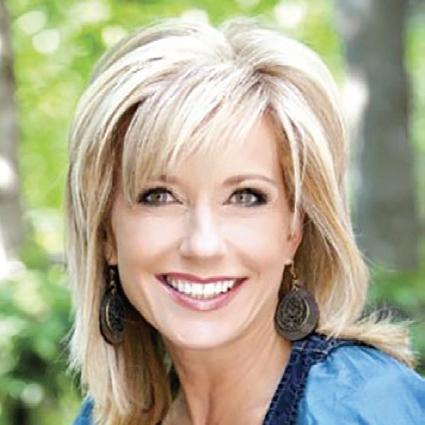
“Try to absorb how acceptable the disesteem and objectifying of women has been when some Christian leaders don’t think it’s that big a deal,” Moore wrote.
– LifeWay Research, The Christian Post, The Daily Beast
Lake Sallateeska | A September Illinois Changers project set 150 students to work on service projects in Pinckneyville. The annual mission weekend, held at Lake Sallateeska Baptist Camp, included projects at the camp and in the surrounding community.
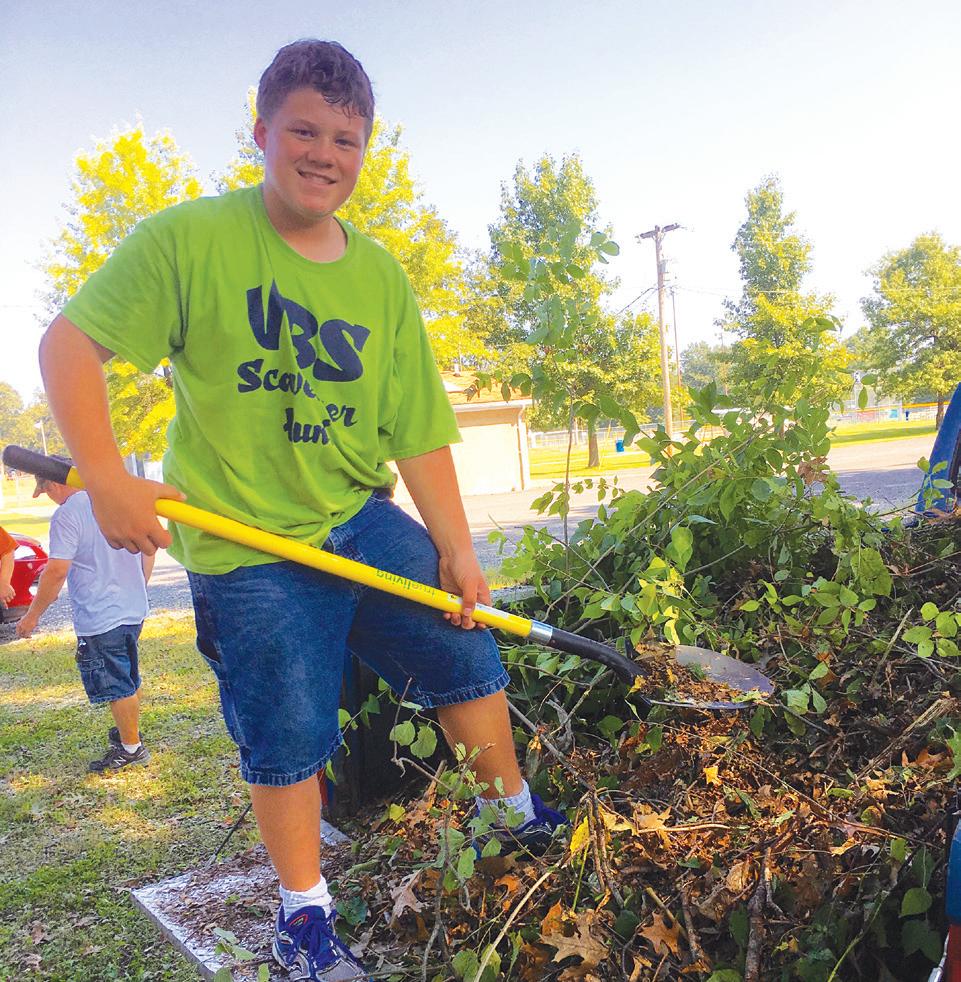
“Sending teams out to serve in local churches and in community projects has always been the purpose behind Illinois Changers,” said Mark Emerson, associate executive director for IBSA’s Church Resources Team. “Being able to use ministry projects to gain a hearing for the gospel is at the heart of why we hold this event.”
Ryan Beck has brought a group of teens from First Baptist Church, Carrier Mills, to three consecutive Illinois Changers projects. They keep going back because it gives the students an opportunity to do things they’ve not done before, the pastor said. They’ve also been inspired to utilize similar strategies to help people in their own community, and to use their skills on mission trips like a recent one to eastern Kentucky.
Plus, Beck said, “Because they plugged in, some of our adults have plugged in.”
“A lot of times, it’s the teenagers that spark the adults to do mission work, and I’ve seen that over the last couple years, both locally and with mission trips.”
In 2017, Emerson and his team are seeking to expand Illinois Changers to include multiple projects for smaller groups around the state. “We would like to see more students have the opportunity to participate in these hands-on mission opportunities.”
For more information about student missions, go to IBSA.org/students.
Bloomington | Three years ago, members of Vale Church in Bloomington showed up one Sunday morning expecting their regular weekly service. But when lead pastor Ted Max got on stage and said he wouldn’t be preaching, they realized that Sunday was going to be anything but normal.
Instead, attendees were instructed to leave, go to the nearest grocery store, and purchase needed items for Home Sweet Home Ministries—a local mission that meets the needs of children and families through shelter services, a fully stocked food pantry, and the good news of Jesus Christ.
That day was coined “Big Give” Sunday. Now in its third year, the most recent outreach included multiple churches in the Bloomington-Normal area that joined forces to help supply as much of the ministry’s annual needs as possible. Together, they provided more than 20 tons of food and goods for Home Sweet Home’s ongoing ministry.
“The impact of an initiative like Big Give is almost immeasurable; 40,000 pounds of food will allow a ministry like Home Sweet Home to provide services to those who are homeless and under-resourced for over six months,” said Mark Weaver, Vale’s pastor of connections.
On September 18, Weaver’s church and seven others partnered with Hy-Vee grocery store for the big day. Hy-Vee made many of the food items accessible just outside the store, and even set up a separate cash register so people could buy their goods and get back to the church as soon as possible.
After people in each of Vale’s three services returned, participants took what they bought to the altar and the congregation prayed over the items and the people who will receive them. They asked God to bless those who will receive the gifts, and that individuals and families will come to know Jesus Christ as a result of Home Sweet Home and their mission to spread the gospel to the people of Bloomington-Normal.
By the end of the morning, over 40,000 pounds of food and personal care items spilled on to the stage and surrounding area, enough to fill up three truckloads.

Because of Big Give, Weaver said, “our community gets to see the capital ‘C’ church take a step together to give those less fortunate a hand-up in their life. Our community doesn’t see divided churches arguing about doctrine or theology, but the Church being united in being the hands and feet of Jesus.”


This report includes contributions received by the Illinois Baptist State Association through the third quarter of 2016. For questions about this report, contact the IBSA Church Cooperation Team at (217) 391-3106, e-mail ChelseaClark@IBSA.org or write to P.O. Box 19247, Springfield, IL 62794-9247.
Nationwide, Cooperative Program giving in 2015-16 was almost 5% above the budgeted goal, for a total of

$195.7 million
SBC Executive Committee CEO Frank Page credited giving by Baptist state conventions as part of the reason for the increase. The last five years are only the third period in SBC history when national Cooperative Program forwarded from the states has reached or exceeded
38.75%.
IBSA currently forwards
43.25%
of gifts from IBSA churches to the national SBC for world missions.
56.75% remains in Illinois to support evangelism, church planting, and other ministries in the state.

At the IBSA Annual Meeting in November, messengers will vote on a measure to increase the percentage forwarded to national SBC to
43.5%
Giving through the Cooperative Program helps plant churches in Illinois like
Bethel SBC in Mt. Prospect.
Church planter Chris Kim (second from right) and his congregation are seeking to reach firstand second-generation Koreans and other people groups in Chicagoland.
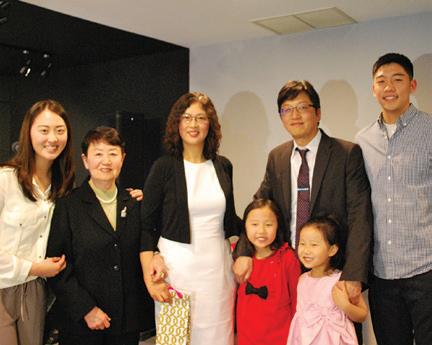
200 miles
southwest of Mt. Prospect, Marvin “Bull” Shultz and his wife, Barb, are planting to reach unchurched people in Galesburg with the gospel.
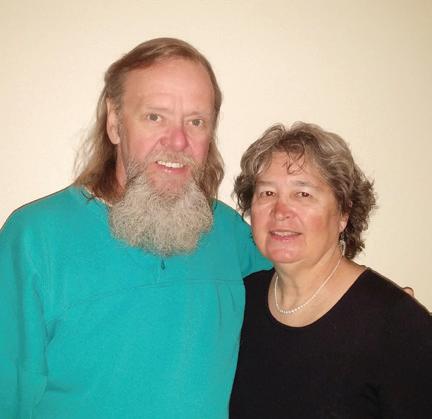
Road to Freedom
20,000
The Cooperative Program also supports leader development in the state, allowing IBSA staff and representatives to train Illinois church leaders more than times in 2015.
Washington First, Washington 100.72
Celebration Community, Pana 99.39
Calvary, Edwardsville 97.45
Cutler First, Cutler 96.64
Pilsen Community, Chicago 96.31
New Salem, Mc Leansboro 95.59
O’Fallon First, O Fallon 93.88
Golf Road, Des Plaines 93.60
Calvary, Monticello 91.28
Blooming Grove, Mc Leansboro 91.09
Tinley Park First, Tinley Park 90.59
Casey First, Casey 88.18
Clarksville, Marshall 87.65
Bethel, Bourbonnais 87.21
Hillerman Missionary, Grand Chain 86.03
Mt Zion, Piasa 85.98
New Hope, Litchfield 85.79
Louisville, Louisville 85.64
Cottonwood Family, Glen Carbon 83.82
Lincoln Avenue, Jacksonville 83.47
Transformed Life, 83.33 Prairie Du Rocher First 82.47
Lovington First, Lovington 81.89
Western Oaks, Springfield 80.97
Effingham First, Effingham 80.94
Nashville First, Nashville 80.84
Calvary, Alton 80.45 Grace Fellowship, Amboy
Louisville 79.21
Grove, Eldorado
Winkle, Coulterville 72.89
Eastview, Belleville 72.78
Samaria Missionary, Albion 71.60
Bethel, Vandalia 71.26
Prior Grove, Oblong 71.05
Fellowship, Vienna 70.75
Calvary, Morris 70.57
A partnership between SBC entities and state conventions to promote cooperative missions and giving has the theme meaning it takes working together to fulfill God’s Great Commission.
every church, every person
Cooperative Program giving supports
3,124
career and apprentice missionaries serving through the International Mission Board, plus 543 more in short-term assignments.
In North America, CP helps the North American Mission Board equip and send out
5,684
“Not Alone,” missionaries, plus more than
3,800 chaplains serving in the military, hospitals, prisons, and disaster relief.
Born in the late 1990s and after, Centennials are in junior high and high school now, and just starting to enter college. These children of Gen-X have distinct characteristics all their own:
They make up 25% of the U.S. population.
They are more likely than older generations to have social circles including people from different ethnic groups, races, and religions.
They have never known a world without computers and cell phones.
Gen-Z grew up during the financial crisis, which taught them to have an independent, entrepreneurial spirit, but also to be more pragmatic about money.
They are more cautious about risky behaviors.
Entering young adulthood, 41% report attending church.
– New York Times, Pew Research
Gen Z is the most recent in a long line of American generations:
(Born before 1928): “The Greatest Generation” defined by winning World War II.
Silent (1928-1945): Children of the Great Depression and WWII.
Baby Boomers (1945-1964): Rule breakers born during a population spike.
Baby Busters (1964-1980): Independent, ambitious, wellacquainted with changing family dynamics, born during population decline, also called Gen-X.
Millennials (1980-about 2000): Tech-savvy and connected, but willing to embrace “vintage” ideals, sometimes called Gen-Y.
Centennials (circa 2000-present): Digital natives, short attention span, cautious seeking relationships, recently identified as Gen-Z.
The past several American generations are known for their most distinct features and what they contributed to society in general: Baby Boomers shaped the country’s socioeconomic landscape. GenXers brought a strong independent spirit to the United States. And talk in recent years has centered around Millennials, the group that came of age during a time of unprecedented technological strides.

But what about those who are growing up in a completely digital culture? Meet Generation Z, also known as Centennials.
There is some debate about the exact year Gen-Zers started being born; many place it in the mid-to-late 90s, or right after the turn of the century. What isn’t in doubt is that from the day they were born, Centennials have known nothing other than the Internet, touch screens, and smart phones. At school, they use laptops and tablets instead of textbooks.
“Technology is huge: If you’re not in the technology, then you’re losing,” said youth leader Cameron Lewis. “If you’re not posting posts and not constantly being active in kids’ lives in that, you’re really missing a huge part of the kids.”
Lewis took a group of students from Cross Church in Carlinville to IBSA’s recent evangelism conference, Youth Encounter, where Centennials in their teenage years are the main audience. Almost 1,500 people attended YE at one of three sites—Marion, Decatur, and Chicagoland—and 351 made spiritual decisions at the conference, where the challenges of reaching Gen Z were front and center.

“They’re just pulled in so many directions that it’s hard to get them to focus on God,” said Angie Owens, a youth leader from First Baptist Church, Petersburg. One 15-year-old student agreed.
“We kind of get distracted easily because we spend so much time on our phones,” said high school sophomore Bailee Book
Despite concerns about the technology, Owens said she sees the need to reach kids through it.
“Jesus said to meet them where they are, and then go from there,” Owens said. “We have to be able to engage them in a way that they’re familiar with. As a school teacher, one of the things that I’m taught is: ‘Know your audience.’ ‘Know your kids.’ That’s your number one rule. You start with where they’re at and then you go from there.”
Not only have Centennials grown up with a knowledge of all things digital, they’ve also always lived in an increasingly diverse world, with decreasing Christian values and a tolerance for multiple definitions of faith.
Those characteristics can present an intimidating picture for churches. How do you reach young people with constant access to all kinds of information, and who are growing up in post-Christian America?
But some church leaders say churches have a unique opportunity to reach Generation Z in the midst of their questioning. Most Centennials are not opposed to having spiritual conversations; in fact, they welcome them. And their focus on technology gives churches a unique opportunity for
face-to-face outreach, said Thom Rainer, president of LifeWay Christian Resources.
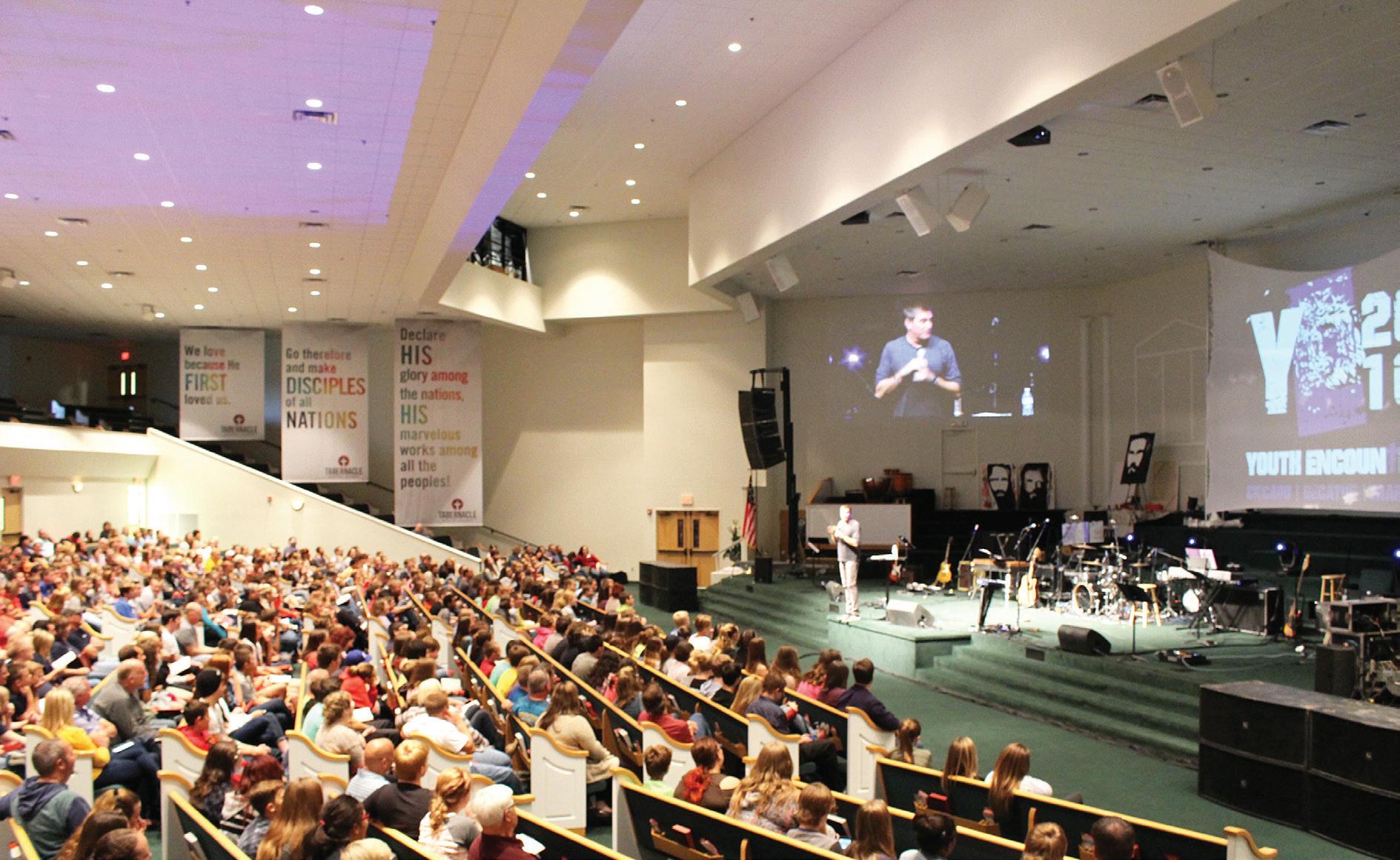
“Yes, they are fully immersed in the Internet and social media, but they really want to have personal interaction,” he wrote in a May 2016 blog post. “Perhaps because of [their] Internet and social media [use].”
Gen-Z has a short attention span—as short as eight seconds, according to some studies. But that also has an upside, some say. Centennials are conditioned to take in new information very quickly. And what’s more, they’re hungry for it, already seeking out knowledge and greater understanding on various topics.
Lonnie Trembly, associate pastor of students at First Baptist Church, Columbia, recommends teaching theology, logic, worldview, and apologetics as early as you can. Generation Z can handle it. “And want to,” he said. Whether they’re believers or not, Gen-Zers are engaged and ready to hear what Christians have to say, so that they can decide if they agree or disagree as they develop and navigate their own beliefs.
But as one blogger said about Generation Z, “They have infinitely more distractions and noises
preventing them hearing the call of God on their lives as clearly as they should.” Is the church is merely adding to the chaos?
Trembly answers this problem with a “less is more” model. As someone who has worked with different generations in the church for 25 years, he said, “Give them focused places to learn more. Too many websites, video clips, etc., pollutes the mind, [where only] a few gives them places to stay focused on.”
Creative communication is key, some leaders say. “Kids are so bored with just talking or doing regular reading or Bible studies,” Angie Owens said. “I think we’ve almost got to add in a little extra.”
Several students at Youth Encounter agreed that “a little extra” humor helped them connect to speakers better.

“It’s lighter, not as serious,” said Alexander John Work, a 15-year-old student from Carlinville High School. “But it’s easier to understand what the person’s saying—grabs your attention more.”
Owens said that it’s good when conferences blend learning about Jesus with some element of entertainment or humor in order to keep kids
engaged—so long as the focus is clear. One of the Youth Encounter worship leaders was Andy Raines, also known as the Passion Painter. Raines creates works of art as part of the overall worship experience.

“I think the IBSA does a great job of balancing entertainment with the gospel,” Owens said. “We know that the kids are going to hear a great band. They’re going to see the illusionist. They’re going to see all this great stuff. But at the same time, they’re going to get the gospel message. That’s our main concern.”
Owens emphasized that balance is necessary.
“We don’t want to go so far that we’re just entertaining,” she said.
Whether it’s through painting or preaching, Lewis said he loves how Youth Encounter 2016 is generating momentum for youth to continue growing in faith.


“I think there are big things in this next generation,” he said. “I think this is a generation that can change a lot of things and that is something I am all for and pushing them to do for Jesus.”
– Reporting by Morgan Jackson and
“When we wake up to November 9, post-election, when the confetti is swept away and the election is finally over, what will we see?...I have a prediction….Another day of God’s perfect sovereignty. He will still be in charge. His throne will still be occupied. He will still manage affairs of the world. Never before has his providence depended on a king, president, or ruler. ‘The LORD can control a king’s mind as he controls a river; he can direct it as he pleases’
(Proverbs 21:1 NCV).”
– Pastor and author Max Lucado, MaxLucado.com (10/11/16)

“This season has made me realize more than ever that my true citizenship is in heaven, not America. Thank God we believers serve a King who can never be corrupted and who gave his life to save the oppressed. We belong to a country whose walls can never be shaken and whose glories will never fade. That reality doesn’t make me one ounce less passionate about seeing change in my earthly country, but it keeps me from despair.”
– J.D. Greear, pastor, The Summit Church, Raleigh-Durham, N.C.; JDGreear.com (10/11/16)
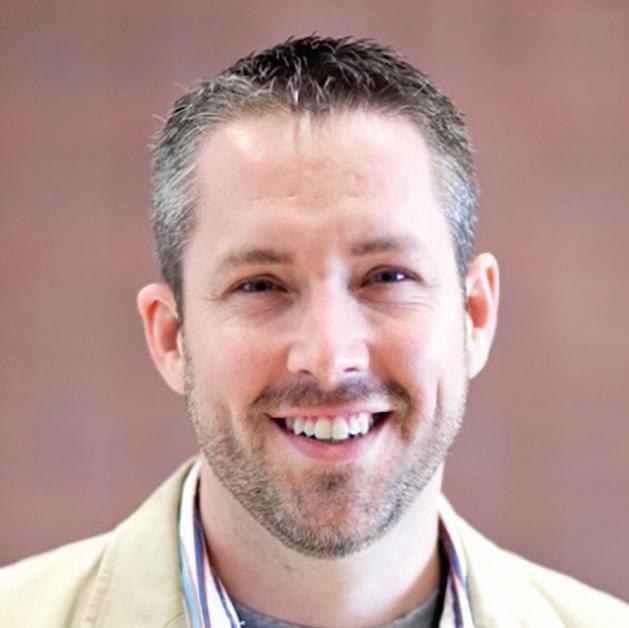
On this crisp Philadelphia morning, Independence Hall sparkles up ahead in the sunlight. The air is fresh, and visitors are quietly buzzing about the history made here. Even waiting in the winding line to see the Liberty Bell is pleasant.
One hundred eighty degrees from this hopeful walk is the trudge we’re all on toward November 8. Fatigue set in several months ago, and has given way to all out weariness. We’re tired of listening, tired of arguing, tired of walking to an end that will inevitably leave at least half the nation unsatisfied, and maybe angry.
But in Philadelphia on a bright October morning, my husband, Chris, and I found hopeful people. Perhaps it’s the reminder that the people who gathered at Independence Hall 240 years earlier to sign first the Declaration of Independence and, later, the U.S. Constitution, fought for something larger than themselves—a truly free society, a democracy that embraced good for all while also committing itself to invaluable individual liberties.
For Christian visitors to Independence Hall, the hope here is undoubtedly tied to the belief that, while flawed, the founding fathers were largely men of faith. People for whom “under God” meant God governed both the world as it was, and the new nation taking shape in Philadelphia.

There is hope across the street too, where a historical placard explains that the Pennsylvania Bible Society was founded there in 1808. The Bible society—America’s first—was established to make Scripture accessible and affordable. That this building is so close to Independence Hall is reason to believe that among those who founded America were people who understood the truths of the Bible, and believed them to be foundationally important.
This election cycle hasn’t been big on hope. A recent Gallup poll found less than a third of Americans believe the election process is working like it should.

But the sunshine illuminating Independence Hall is a reminder that light shines brightest in the darkness, and that God brings hope where there is none.
– Meredith FlynnI am not claiming to be an expert in these matters, however, as a lifelong voter in Chicago and the state of Illinois, I have learned a thing or two about terrible choices when it comes to elections.
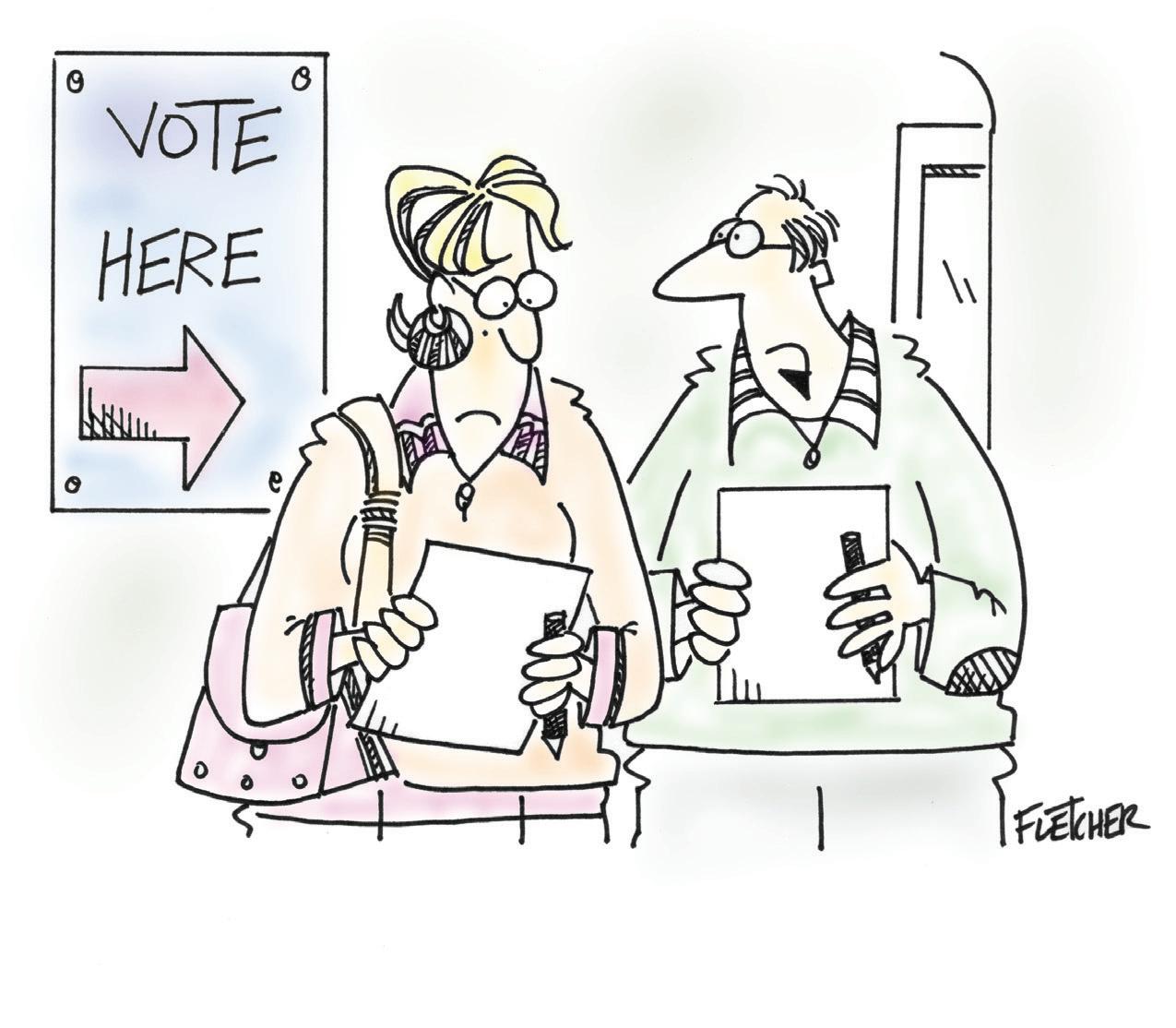
There have been elections I felt slightly better about. Those would be exceptions to the rule. More often I dread my trip to my neighborhood polling place. My best option is often to cast a vote that might, just might, move the mud around in a way that challenges the status quo. At least that’s what I tell myself.
This election highlights our social decay and cultural rot. This election serves up exactly what we deserve. Pulpits across our country have gone soft and silent on the injustices of the day, substituting the American Dream for the gospel of Christ. We do not tolerate prophets today. We are not very salty and we seemingly have not “let our little light shine.”
We are in the middle of a crisis we helped create. I read a fascinating perspective that sums up the choices before us: Imagine that in front of you are two doors. You must choose a door. Behind door number one, there’s a man-eating lion. Behind door number two may be a man-eating lion. But you still have to choose a door.
We must vote. Bad choices do not let us opt out. The blood of every soldier in every battle under the red, white, and blue, cries out. Too many people have sacrificed too much to preserve our right to go to the polls for us to say, ‘‘I’m staying home.”
In the spirit of transparency, I’ll say yes, I have written in the names of candidates. That was many years ago. Maybe I was more stubborn then, maybe I was more arrogant. I don’t know. Now, I want to cast a ballot that counts in the real contest.
We must remember the stewardship of the ballot. Managing this sacred trust as a believer must be done with Scripture, prayer, and reverence. I turn to Scripture for guidance in such matters. There is no direct parallel for the presidential election of 2016, but there are some principles to guide me:
Joseph didn’t get to vote. He didn’t just serve Pharaoh, he served Pharaoh with a great attitude. He didn’t go on Facebook and rant about Pharaoh’s unsuitability, moral failures, or bloodletting. He knew God placed him right where he found himself, be it a prison cell or Pharaoh’s palace. Moses’ parents returned him to Pharaoh’s house to be raised and educated. Moses didn’t get a vote. Moses served Pharaoh, the king who was enslaving his own people.
Nebuchadnezzar would make us happy to have either Clinton or
Trump. Talk about hubris and arrogance! Daniel didn’t get a vote. He had no say. Daniel served the king, and yes, with a great attitude. He understood he was where God wanted him, doing what God desired.
Oh, then there’s Ahasuerus, a king typical in the ancient world, who withheld from himself no vice or whim, who wielded power out of an unfettered, depraved ego. Esther had no vote. Shall we say euphemistically, Esther served and she did so with a great attitude.
I recently visited with a missionary serving churches in the former Soviet Union. He lovingly laughed at what he hears overseas of our consternation over the Trump/ Clinton choice. He grew up under communism in the USSR. He is now navigating the reality of the new Russian legal restrictions on evangelism. Yes, he laughed at us, saying in his thick Russian accent, “You Americans need to remember, God is in control.”
My friend is right. God owns the world (Psalm 24:1). God rules the world (Psalm 103:19). God manages the world (Daniel 5:2123). God works through rulers he chooses (Romans 13:1-7).
Whatever the outcome on November 8, God gets done what God wants done, whether through Darius or Cyrus; Nebuchadnezzar, Belshazzar, or Ahasuerus; Caesar Augustus, or the murderous Herod. God is in control.
Charles Lyons is pastor of Armitage Baptist Church in Chicago.

He’s in front of you in the grocery line. She’s the new girl in your child’s classroom. They’re the family who moved in next door. You’ve read about immigrants or refugees moving to your town, but you’re not sure what to say…so you just turn your head.
What’s a correct Christian response to strangers in your community? When we see immigrants as individuals—dearly loved by God—it’s easy to truly care. Your Bible class, ministry group or entire church can impact eternity when you accept this new mission field in your own back yard. Ministry to immigrants and refugees can enliven your church. Seek out refugees or immigrants, and ask God to guide you to minister to them. Your method of ministry will vary widely to fit needs of individuals and people groups, but the goal is the same: to show God’s love and share his plan of salvation. Some of these simple ideas may help you get started. Begin an ESL class in your home or church to assist with language. Personally invite each refugee to the class.
DIANA DAVIS
When you see a need, find a way to meet it. Assist with children’s school registration, finding medical or dental assistance, connecting utilities, or basic skills such as grocery shopping.
Offer help with employment, such as job leads, interview tips, wardrobe assistance, or computer skills. Some may be professionals, so pair them with church members in similar vocations for assistance.
Be a true friend. Learn their names. Pronounce them correctly. Invite them to your home. Give a baby shower for a new mom. Give a Bible in their native language.
Show love to their children. Give a backpack of treats, school supplies and clothing. Invite them to play with your kids. Help with homework. Include them in church events. Bring them to church. Include them in worship, Bible class, Vacation Bible School, and every aspect of church. Provide translation headphones or a worship service in their language, if needed.
Most important, help refugees find true refuge in God. Share Jesus. There she is, in front of you in the grocery line. Initiate a conversation now.
© Diana Davis. Her new book, “Across the Street and Around the World,” will be released this fall.
This election highlights our social decay and cultural rot. Still, we must vote.
“It’s kind of like a church pot luck when the only choice of vegetables is lima beans or okra.”
Welcome
Ron Bruce was installed Oct. 2 as the new pastor of Victory Rock Fellowship in Marengo. Bruce’s previous ministry experience came in Michigan as an outreach and student ministry leader. He also taught several subjects to at-risk youth at an alternative high school. He and his wife, Sara, have three children: Ethan, Brian, and Emily.
Brian Fuller is now serving as pastor of Ellis Mound Missionary Baptist Church in Wayne City. Fuller formerly served as minister of music at Logan Street Baptist in Mt. Vernon and as pastor of Towerview Baptist in Mt. Vernon and Marshall Missionary Baptist Church. He and his wife, Tina, have two children and two grandchildren.
Pontoon Baptist Church in Granite City ordained their pastor, Joshua Steeley, to gospel ministry on October
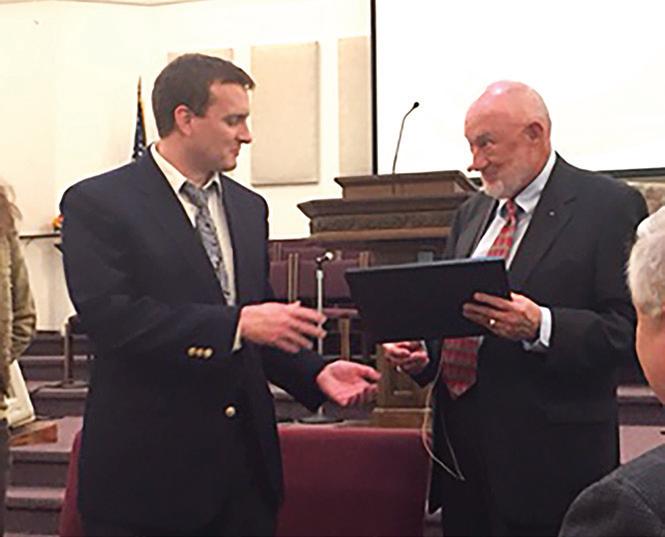


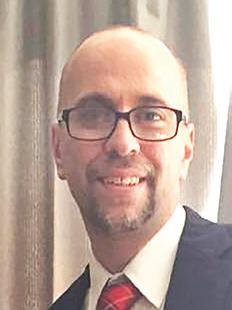
9. Steeley, who began serving at the church in April, is married to Kate, and the couple has a son, Jeffrey. Rob Schneider, pastor of Calvary Baptist Church in Edwardsville, delivered the charge to the church, and Gateway Association director of missions Tracy Jaggers brought the charge to the candidate. Deacon Gary Chaney (pictured, right) presented the ordination certificate.
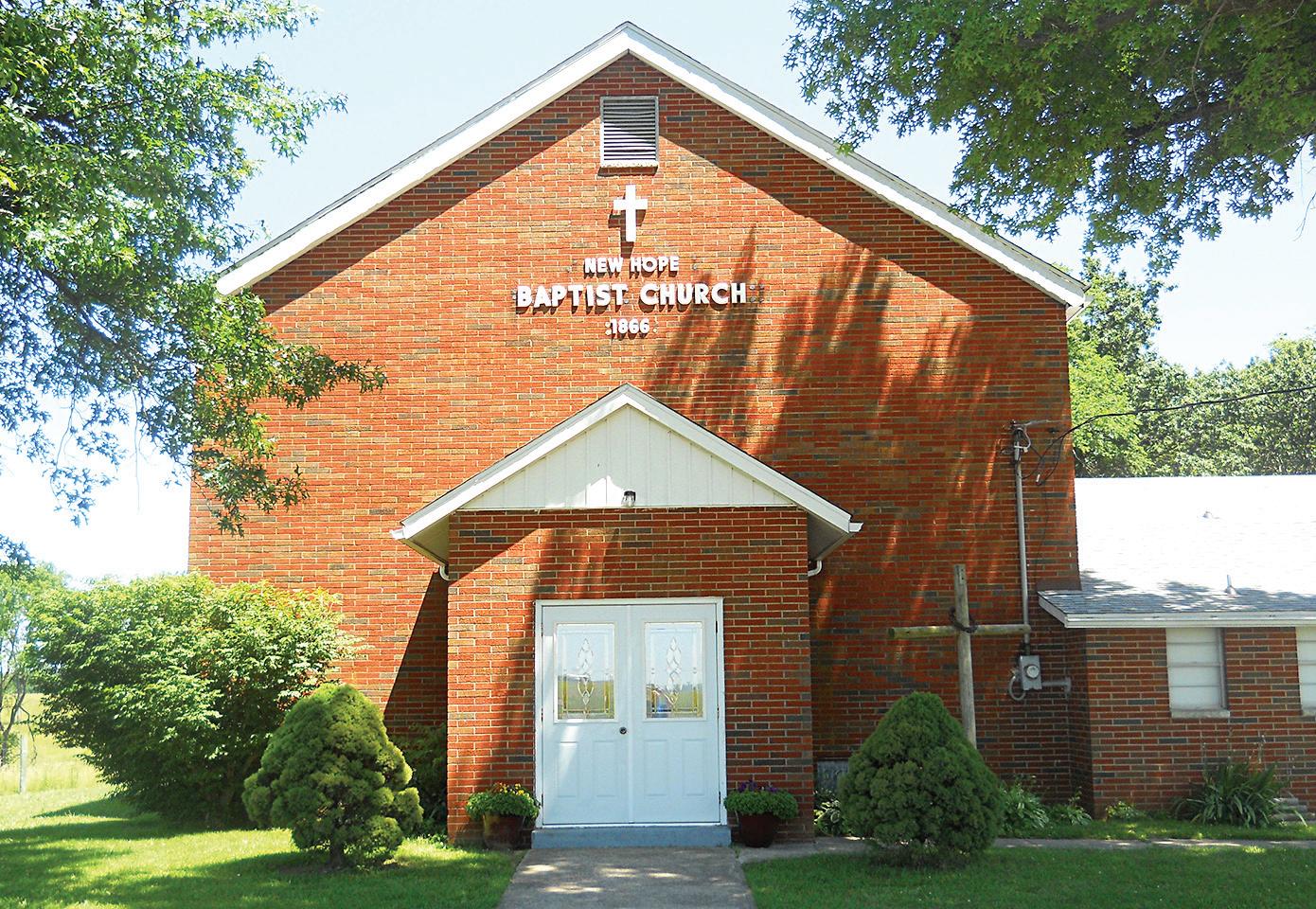
Norman B. Lockwood, a longtime Illinois director of missions, died October 9 at the age of 80.
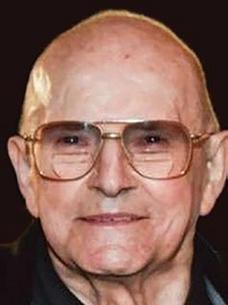
Lockwood grew up on a farm south of Pana, Ill., and graduated from Pana High School in 1956. He went to The Southern Baptist Theological Seminary in Louisville, Ky., where he earned a Master of Divinity degree. He stayed an additional year in Kentucky to pastor a church before returning to Illinois, where he led several churches, including congregations in Robinson, Ramsey, and Patoka.
He became director of missions for Westfield Baptist Association in 1994 and served the association for 22 years. Lockwood was named “Director of Missions Emeritus” in February. As a DOM, said Pastor Fred Harner, Lockwood “was one who cared about his pastors.” Harner, who himself was Lockwood’s pastor for the past year at Mt. Zion Baptist Church in Neoga, said that even when Lockwood was living in a nursing home, he would call to check on the church and ask how he could pray for the pastor.
Sylvan Knobloch, IBSA’s director of church leadership development, remembered Lockwood as “a kind man who had a strong work ethic.” He assisted with a church plant in Paris, Ill., and pastored churches in Neoga and Toledo while serving as director of missions. In later years, Knobloch said, Lockwood visited pastors and attended associational and IBSA meetings, even with weakened health.
PAID ADVERTISEMENT
The congregation of Cross Keys Baptist Church is prayerfully looking for a bivocational senior pastor. We are poised to follow a godly and dynamic shepherd who understands and upholds 1Timothy 3:1-7 and Titus 1:59, and are accepting resumes through Dec. 1, 2016. Respond online at pastorsearch@ crosskeysbaptistchurch.org or send hard copies to us at 14255 New Halls Ferry Rd., Florissant, MO 63033.
Find more information on ministry positions at IBSA.org/connect
Send NetworkiNg items to IllinoisBaptist@IBSA.org
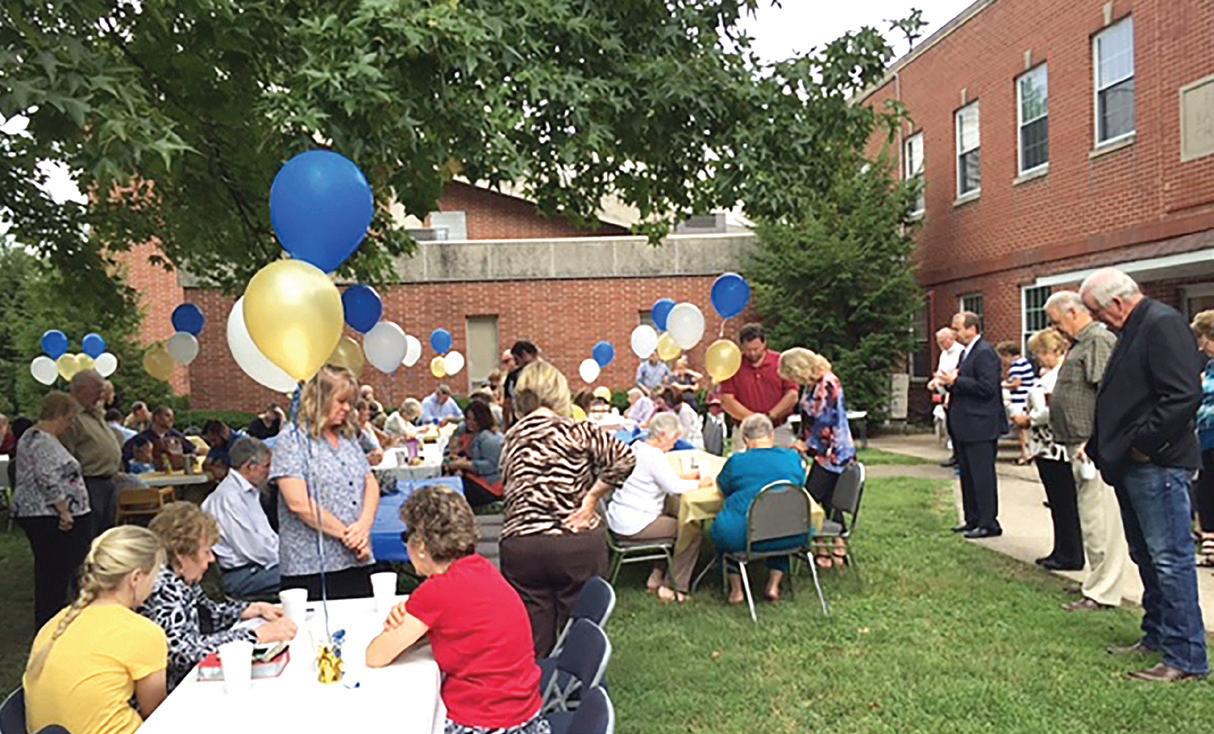
Salem South Baptist Association, headquartered in Mt. Vernon, is seeking a director of missions. For more information, contact the association at (618) 240-5780.
Mullen Baptist Church in rural Montrose is a small country church of dedicated people seeking a bivocational pastor to share God’s Word. Interested parties may send resumés to Mullen Baptist Church, 420 Co. Rd. 825 East, Jewett, IL 62436.
An
Visit:
conta.cc/2e7gkOk
Thanks for your participation!
Eternity Baptist Church in Centralia is seeking a pastor with strong leadership skills who will minister to the needs of our church and lead the church in outreach to the lost in our community. Send resumes by Dec. 1 to Pulpit Search Committee, Eternity Baptist Church, 500 West McCord St., Centralia, IL 62801, or email resume@eternitybaptist.org. For further questions, (618) 532-9596.
“Norm had a ministry of presence,” Knobloch said. “He was available and approachable.”
Lockwood was preceded in death by his wife, E. Louise Wills; his parents; and three brothers.
He is survived by his wife, Ann, whom he married in 2002, two years after they both lost their spouses of 40 years. He is also survived by four children; four step-children; 15 grandchildren and step-grandchildren; and 10 great-grandchildren.
Energy First Baptist Church is seeking a new pastor. The candidate should be a Southern Baptist with the ability to be self-supporting. Most importantly, he should be God-led, love the Lord, have love and concern for all the people in the church, and be willing to visit the sick and shut-ins. Any interested candidate can send a resume by Nov. 7 to Energy First Baptist Church. P.O. Box 280, Energy, IL 62933.
investment of 10-15 minutes of your time will help IBSA assess current ministries and plan more effectively for future work.
October 24-26
What: For full-time ministers of music and worship leaders
Where: Lake Sallateeska
Cost: $55 per person
Contact: DebbieMuller@IBSA.org
November 1-2
What: Preaching conference on “Crossroads: Our Pathway to Reconciliation”
Where: Broadview Missionary Baptist Church, suburban Chicago Info (and list of speakers): IBSAannualmeeting.org
November 2-3
What: The 110th IBSA Annual Meeting will feature the annual sermon by Adron Robinson, pastor of Hillcrest Baptist Church, Country Club Hills.
Where: Broadview Missionary Baptist Church, suburban Chicago
Information: IBSAannualmeeting.org
Contact: SandyBarnard@IBSA.org
November 2
What: Conference and luncheon for all ministers’ wives
Where: Broadview Missionary Baptist Church, suburban Chicago
Cost: $15 per person
RSVP: lmcdonald_31@hotmail.com, (618) 518-9346
November 4-5
QI just read “The Total Money Makeover,” but I’m still unclear as to why you recommend saving for an emergency fund and retirement before paying off your home. Shouldn’t a house be paid off as quickly as possible, since it’s a liability?
What: Discipleship-focused weekend for girls in grades 7-12


Where: IBSA Building, Springfield
Cost: $20, includes T-shirt and lunch on Saturday Register: IBSA.org/Students
November 12
Where: Uptown Baptist Church, Chicago Register: IBSA.org/Worship
AI appreciate the fact that you’re asking questions and thinking things through. But please don’t fall into the trap of thinking of your home as a liability. That mindset is way off base, in my opinion.
Your house is definitely an asset; it’s the mortgage that’s a liability. Some folks may try to position a house as a liability simply because it costs you money. But the truth is your home will make you more money than it will cost you over time. Therefore, it is an asset.
Some of the saddest situations I’ve seen in all my years of teaching are seniors who have
paid-for homes and nothing saved or invested. Money isn’t the most important thing on earth, but it is a fact of life. That’s why I encourage people to build an emergency fund of three to six months of expenses and begin saving for retirement before they tackle paying off their homes.
Then, after all that is addressed, take every dollar you can scrape together and put it toward paying off your mortgage as fast as possible. Good question!
Financial advisor Dave Ramsey is a prolific author and radio host.

THE DOOR YOU OPEN TODAY DETERMINES THE DOORS THAT WILL OPEN TO YOU TOMORROW. At Judson, we understand the importance of providing you with opportunities — for knowledge, experiences, spiritual growth, and preparation in your chosen field of study. Opportunity is knocking. Open the door to Judson.

Location: Lawrence County
Focus: The Country People
Characteristics: In one of the most unreached counties in Southern Illinois. Over 60% of the people have no religious affiliation. The majority of the people live in country settings and work in Vincennes, Indiana.

Prayer needs: That God would raise up a person with the passion to reach the rural areas of Lawrence county. Also pray that there will be a healthy, dynamic new church planted.
pinterest.com/illinoisBaptist

Nov. 6 & 13
Persecution is a daily reality for at least 100 million Christians, according to reports. For two decades, their needs have been the focus of special prayer days each year. Now believers in more than 100 countries observe International Days of Prayer for the Persecuted Church. “Let’s pray that in spite of the pressure and persecution, our suffering brothers and sisters—wherever they may be in the world—would stand firm in their faith, holding fast to the promises of God in Christ,” said Godfrey Yogarajah of the World Evangelical Alliance. Graphics, videos, and more resources are available at IDOP.org.
In the rush to Christmas, we’re missing one of the best outreach opportunities of the year: Thanksgiving. College kids come home and bring friends with them. International neighbors are curious about American holidays. And many churches report their highest holiday attendance on the Sunday before Thanksgiving. Try these ideas to make the celebration special.
Communion. Focus on families. Gather in little groups. Help parents pray over their kids. Pie and praise. Combine homemade pies and thankful testimonies.
Count your blessings. Literally. Give each person a sheet with numbered lines. List a 2016 blessing by each one.
Quiet worship. Before the craziness of the season begins, advertise a quiet service with simple reflections and some soft music. Thank you notes. Print cards with the church logo on them. Have worship attenders write a few notes to friends, doctors, teachers, mentors, military personnel, deacons, small group leaders, first responders.
devotional
“…Always be eager to practice hospitality”
(Romans 12:13)
Paul’s exhortation to pursue hospitality reminds us that we should seek to be a blessing to others both personally and corporately. Being a blessing means we want to strengthen and build up someone else. We can bless others by affirming their value with encouraging words, acts of kindness, or gifts.
We recently held our annual Family Fall Festival in which we as a church seek to be a blessing to our community. There were many visitors to our campus who carried burdens. We had prayer volunteers who heard about those concerns and had the privilege of praying with them and offering a word of encouragement to them. There were families attending who needed the time to be a family. We provided a setting that was safe and allowed them to relax, laugh, and recharge. There were those who came who didn’t know Jesus. We had the opportunity to share the good news of Jesus, his love and sacrifice for their sins, the forgiveness of the those sins, and the life everlasting he gives.
To be a blessing requires intentionality and effort on our part, but it is worth our time and resources to know the gospel seed has been planted and see the smiles of gratitude because someone took the time to encourage them.
PRAYER PROMPT: Dear Lord, make us a blessing to someone today for your name’s sake. Amen.
Kevin Carrothers serves as pastor of Rochester FBC and president of IBSA.
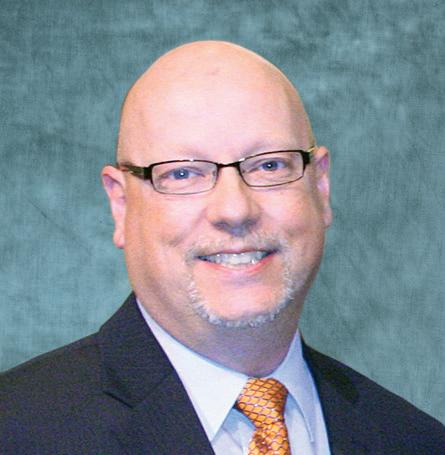
Pastors, join the IBSA Pastors’ Prayer Room on Facebook. E-mail oweaver7307@ gmail.com.
Leaders often are tasked with communicating vision. They call people to action, urging them to move from observers to participants. And often, they become leaders themselves. But sometimes the vision is difficult. Sometimes, successes aren’t resounding. Instead, they’re just drops in a very large bucket.
For a few years now, our team has been working to equip and advise churches on the issue of human trafficking. It’s an exceedingly messy, heartbreaking problem, and casting a vision for people to help prevent it is also complicated.
When an issue is so big, how do effective leaders guide people to real engagement, even without the promise of results?
Here are some helpful tips we’ve learned along the way:
Our first step was deciding what our “bite” of the issue would be. Leaders working within a big issue or problem know they can’t fix it on their own, even with all their resources. As we looked at the huge issue of trafficking, we set out to find the piece we could affect.
Next, we sought to captivate people’s minds and hearts. We tried to paint a holistic picture of the issue and its root causes. When leaders cast vision by communicating the source of a problem, the problem becomes more personal to the people who are hearing about it. And people start to feel more responsible for engaging the issue, even if it’s difficult.
Our most recent action step was to recruit a state advisory team to help educate churches on the issue of trafficking. We looked for people who were already involved in the work, and are working to get resources into their hands so that they become the experts and can impart that wisdom to local church leaders.

Most of all, as leaders, we’re working to keep our primary purpose—discipleship—as our priority. Although trafficking, or any other difficult issue into which you lead people—is incredibly important, it is not our main calling. We are called to make disciples.
Trafficking isn’t going to go away on our watch, but by equipping people to embrace a difficult vision, we’re seeing God grow and mature disciples of Christ.
Carmen Halsey is IBSA’s director of women’s ministry and missions.
